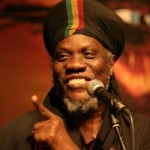Mutabaruka
Mutabaruka (formerly Allan Hope) was born in Rae Town, Kingston on 26th December, 1952. After primary education he attended Kingston Technical High School, where he was a student for four years. Trained in Electronics, he left his first job after about six months and took employment at the Jamaica Telephone Company Limited. During his time at the Telephone Company he began to examine Rastafarianism and to find it more meaningful than either the Roman Catholicism of his upbringing or the political radicalism into which he had drifted.
In the late 1960’s and early 1970’s there was an upsurge of Black Awareness in Jamaica, in the wake of a similar phenomenon in the United States. Muta, then in his late teens, was drawn into that movement. Illicitly, in school he read many “progressive books” including Eldrige Cleaver’s Soul on Ice and some that were then illegal in Jamaica, such as The Autobiography of Malcom X. Muta saw himself as a young revolutionary. But when he deepened his investigation of Rastafarianism, which he had once regarded as essentially passive, he came to find its thinking more radical than that of the non-Rastafarian group with which he had associated. While still employed at the Telephone Company, he stopped combing his hair, started growing locks, altered his diet, and declared himself Rastafarian. A number of his friends thought he was going mad.
After leaving the Telephone Company, Muta found life in Kingston increasingly unsatisfactory. He and his friend Yvonne left Kingston in 1971 in search of a more congenial environment. They have settled in Potosi District, in St. James. They have two children and the house that Muta built. Muta has had periods of close contact with the Negril Beach Village, where he has explained to guests certain aspects of Jamaican culture. He has talked at great length with many foreigners, and has found the experience broadening. To Muta now, Rastafarianism is part of a universal quest which may also be pursued by other routes, such as Hinduism or Buddhism or Christianity. He disapproves, however, of institutionalized religion: the priest “has used your mind/to make love/with the/dead.”
Muta was the first well-publicized voice in the new wave of poets growing since the early 1970’s. They have developed a living relationship between a poet and a fairly wide audience such as, in Jamaica, only Louise Bennett has achieved before them. Early work by Muta regularly appeared in Swing, a monthly that gave fullest coverage to the pop music scene. Introducing Outcry (March, 1973) John A. L. Golding Jr. wrote: “In July 1971, Swing Magazine published for the first time a poem by Allan Mutabaruka.
Personal Sites



This is Lucius from Montego Bay Paradise. IMPORTANT! Please contact me. I’m in L.A. California.
Lucius O’connel
323-872-3308.
Email [email protected]
Greetings, Mr. Lucious O O’Connel
I hope you have been able to contact the Honorable Mutabaruka. Perhaps, you could share the following book with him next time if you find it interesting since it is widely reported that he is a major Rastafarian leader: Pure Worship of Jehovah Restored At Last! at jw.org’s Books&Brochures. It is not normally distributed from door to door, but is available at the website for any and all to examine.
Michele